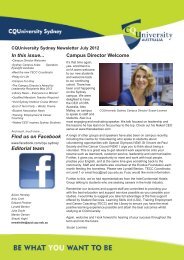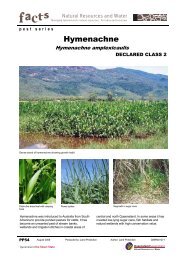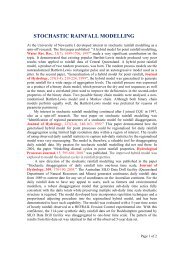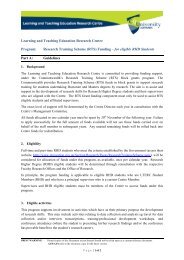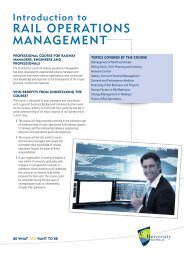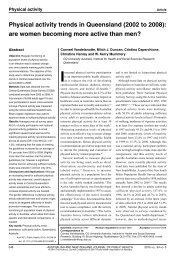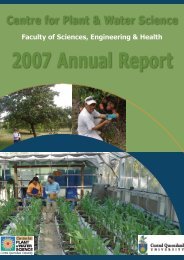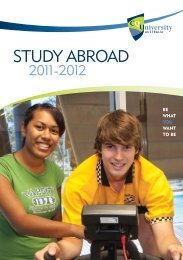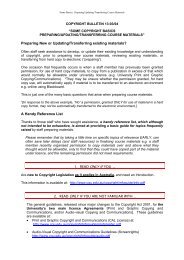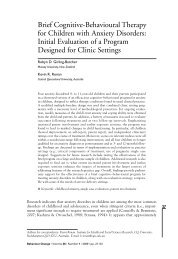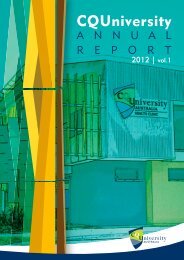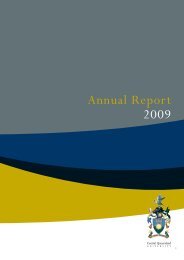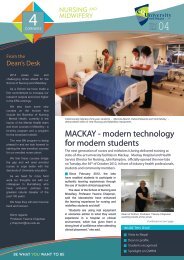Annual Report 2008 - Central Queensland University
Annual Report 2008 - Central Queensland University
Annual Report 2008 - Central Queensland University
Create successful ePaper yourself
Turn your PDF publications into a flip-book with our unique Google optimized e-Paper software.
Learning &<br />
Teaching<br />
• Respond to current trends in student demand;<br />
• Develop a statement that will uniquely describe CQ<strong>University</strong>’s learning models;<br />
• Identify a set of underpinning educational principles; and<br />
• Determine organisational support and system requirements needed to implement<br />
the learning models.<br />
The first part of the project involved interviews with a number of academic staff<br />
across the faculties and regional campuses about their approaches to learning<br />
and teaching, with the findings providing very useful information about current<br />
approaches, issues and challenges across a number of our programs. The next phase<br />
of the project, in 2009, is to share and further build on these preliminary findings via<br />
a series of workshops with academic staff across disciplines and campuses.<br />
Two new Communities of Practice were established during <strong>2008</strong>, an Online<br />
Learning Community of Practice (CoP) and a Faculty CoP within the Faculty of<br />
Business and Informatics (now know as the Faculty of Arts, Business, Informatics and<br />
Education). Communities of Practice, which have been created in response to staff<br />
needs, provide a forum where staff can meet and discuss and reflect on issues related<br />
to their role and learning and teaching practices.<br />
As part of CQ<strong>University</strong>’s commitment to quality outcomes in Learning and<br />
Teaching, the <strong>University</strong> conducts a regular series of lunch time seminars focusing<br />
on educational research, scholarship in learning and teaching, or critical issues<br />
affecting learning and teaching. The total number of participants who attended these<br />
seminars in <strong>2008</strong> was approximately 588. This is a 13% increase in participation<br />
from 2007.<br />
The Early Career Academics Program (ECAP) is designed to assist in the<br />
professional development of recently recruited early career academics. ECAP<br />
aims to provide early career academics with a comprehensive suite of skills,<br />
knowledge and abilities to ensure a successful academic career, as well as support<br />
and opportunities to develop strong networking and collaborative relationships.<br />
CQ<strong>University</strong> staff self-identify as early career academics, and ECAP participants<br />
are provided with mentors. This program was established in 2007 for staff on the<br />
Rockhampton campus. This program continues to be initiated and facilitated by<br />
Dale Trott (Lecturer) in Health and Human Performance. The program content is<br />
designed and facilitated by staff development professionals within the <strong>University</strong>.<br />
The program was launched on 10 July <strong>2008</strong> with 27 early career academics<br />
attending, including three from Mackay and three from Bundaberg who attended<br />
the launch in Rockhampton. This program continues to receive strong support from<br />
academics across the <strong>University</strong>.<br />
The successful Foundations of <strong>University</strong> Learning and Teaching (FoULT) induction<br />
program was offered twice during <strong>2008</strong> for new academic staff. In <strong>2008</strong>, the program<br />
included the course ‘Introduction to Research Training’, which was previously<br />
offered as part of research supervisor training. In support of the teaching-research<br />
nexus, all FoULT attendees are provided with the Jenkins, Healey & Zetter (2007)<br />
book “Linking teaching and research in disciplines and departments”. The impact<br />
evaluation of the 2007 FoULT offerings found that staff benefitted in a number of<br />
ways from attending, valued the program and would recommend it to other staff and<br />
to new staff as being useful in their role as an academic at CQ<strong>University</strong>.<br />
Nulloo Yumbah continues to engage in activities which encourage and support<br />
Indigenous people to access CQ<strong>University</strong> programs. The Centre works<br />
collaboratively in small team groups to develop and improve alternative entry<br />
pathways, learning and teaching, recruitment and retention, and enrolment and<br />
promotions. Nulloo Yumbah staff work collaboratively with other areas of the<br />
<strong>University</strong> to maximise the opportunities for successful student engagement.<br />
52



